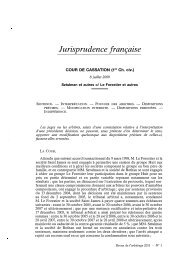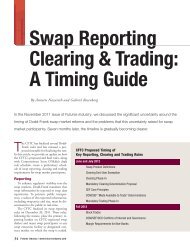What is a Broker-Dealer? - Davis Polk & Wardwell
What is a Broker-Dealer? - Davis Polk & Wardwell
What is a Broker-Dealer? - Davis Polk & Wardwell
You also want an ePaper? Increase the reach of your titles
YUMPU automatically turns print PDFs into web optimized ePapers that Google loves.
<strong>What</strong> Is a <strong>Broker</strong>-<strong>Dealer</strong>? § 1A:2.6<br />
Section 3(a)(1) of the Exchange Act defines the term “exchange” as<br />
“any organization, association, or group of persons, whether incorporated<br />
or unincorporated, which constitutes, maintains, or provides a<br />
market place or facilities for bringing together purchasers and sellers of<br />
securities or for otherw<strong>is</strong>e performing with respect to securities the<br />
functions commonly performed by a stock exchange as that term <strong>is</strong><br />
generally understood, and includes the market place and the market<br />
facilities maintained by such exchange.” 128 Exchange Act Rule 3b-16(a)<br />
interprets the section 3(a)(1) definition to mean any organization,<br />
association, or group of persons that: (i) brings together the orders of<br />
multiple buyers and sellers; and (ii) uses establ<strong>is</strong>hed, non-d<strong>is</strong>cretionary<br />
methods (whether by providing a trading facility or by setting rules)<br />
under which such orders interact with each other, and the buyers and<br />
sellers entering such orders agree to the terms of a trade. 129<br />
Rule 3b-16(b) expressly excludes the following systems from the<br />
meaning of “exchange”: (i) systems that merely route orders to other<br />
facilities for execution; (ii) systems operated by a single reg<strong>is</strong>tered<br />
market maker to d<strong>is</strong>play its own bids and offers and the limit orders<br />
of its customers, and to execute trades against such orders; and<br />
(iii) systems that allow persons to enter orders for execution against<br />
the bids and offers of a single dealer. 130 Absent an exemption, an<br />
exchange must reg<strong>is</strong>ter as a national securities exchange pursuant to<br />
section 6 and section 19(a) of the Exchange Act.<br />
In 1998, the SEC adopted Regulation ATS, which allows alternative<br />
trading systems (ATSs) to choose whether to reg<strong>is</strong>ter as national<br />
securities exchanges or to reg<strong>is</strong>ter as broker-dealers and comply with<br />
additional requirements of Regulation ATS depending on their activities<br />
and trading volume. 131 An “alternative trading system” means<br />
any organization, association, person, group of persons, or system<br />
(i) that constitutes, maintains, or provides a market place or facilities<br />
for bringing together purchasers and sellers of securities or for otherw<strong>is</strong>e<br />
performing with respect to securities the functions commonly<br />
performed by a stock exchange within the meaning of Rule 3b-16<br />
under the Exchange Act, and (ii) that does not set rules governing the<br />
conduct of subscribers other than the conduct of such subscribers’<br />
trading on such organization, association, person, group of persons, or<br />
system; or d<strong>is</strong>cipline subscribers other than by exclusion from<br />
trading. 132<br />
128. See Exchange Act § 3(a)(1).<br />
129. Rule 3b-16(a).<br />
130. Rule 3b-16(b).<br />
131. See Regulation of Exchanges and Alternative Trading Systems, SEC<br />
Release No. 34-40760 (Dec. 8, 1998).<br />
132. Regulation ATS, Rule 300(a).<br />
(<strong>Broker</strong>-<strong>Dealer</strong> Reg., Rel. #9, 9/10)<br />
1A–33





